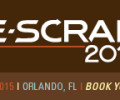A quick, efficient turnaround
A quick, efficient turnaround
<
GFL worked with Quebec-based Machinex on the design and implantation of MRF’s sorting system. The 80,000-square-foot MRF is highly automated, featuring seven optical sorters as well as one Machinex SamurAI artificial intelligence (AI) robotic sorter. Miranda says the system also has the flexibility to adjust to new and more stringent demands of domestic and international fiber end markets as requirements evolve.
Last year, the National Waste & Recycling Association, Arlington, Virginia, awarded GFL’s Winnipeg MRF with its 2020 Recycling Facility of the Year award. Miranda says several features make the facility unique, including its processing system design , high material recovery and purity rates that are attested to by clients and its high overall commodity product qualities confirmed by references from its recycling partners.
GFL’s Winnipeg MRF features a custom, automated sorting system with an annual processing capacity of 100,000 metric tons of single-stream materials per year. Currently, the MRF is processing between 65,000 to 70,000 metric tons per year of materials, Miranda says this allows “ample capacity or future residential and commercial needs.”
He says, “The system was designed to be smart, flexible and adaptable whereby the process flow can be adjusted to manage potential changes in composition of incoming waste streams.”
Miranda adds that this facility has one of the most advanced sorting and recovery systems in Canada. The MRF also features an education room that allows visitors to view the system from an integrated platform and a video feed.
When designing and constructing the MRF, Miranda says it was very important for GFL to “think ahead” regarding potential composition changes in the material stream. He adds that it was also important to create redundancy in the system.
“With redundancy, when you design, don’t design as if everything is running 100 percent all the time,” he says. “If one optical were to not work, how can it still perform well if there’s a technological glitch?”
He concludes, “With COVID-19 we are happy we designed this MRF with a lot of space and lunchrooms and locker rooms as well. We effectively social distanced as well and provided necessary tools for PPE (personal protective equipment). Machinex did a great job installing the equipment after we designed it, and everything has been running great.”
]]>
Source: Recycling Today
A quick, efficient turnaround
<

